Cleveland Clinic in Florida Quarterly Update
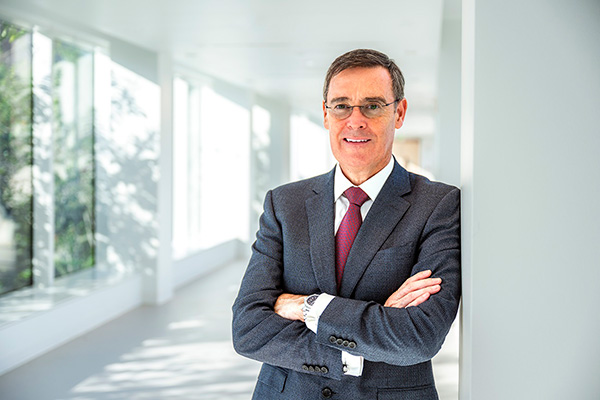
Dear Friends,
I am thrilled to share your generosity's remarkable impact on Cleveland Clinic’s mission in Florida. Thanks to the phenomenal success of the Palm Beach Ball, we are one step closer to providing world-class healthcare to the Palm Beach community. So far, we have raised more than $100 million in our campaign to establish a hospital and outpatient facility in West Palm Beach. Your steadfast support is truly shaping the future of medicine in our region. Read more about our efforts here.
Across our health system, we continue to grow and innovate. At Cleveland Clinic Indian River Hospital, we are expanding our Emergency Department to enhance access and improve emergency care for our community.
At Martin Health, we proudly celebrate our achievements in delivering exceptional care as the No. 1 hospital system on the Treasure Coast. The team served more than one million patients in 2024 and Patient Experience scores have risen to reflect Martin Health’s commitment to teamwork.
Furthermore, the Hospital At Home Users Group named our Hospital Care At HomeSM program, “Program of the Year.” This recognition reflects the tremendous impact of this initiative, which has now been expanded across all five Cleveland Clinic Florida hospitals. Since its growth in early 2024, it has facilitated more than 2,800 admissions and prevented nearly 8,000 hospital stays, allowing patients to receive top-tier care in the comfort of their own homes.
Your generosity fuels these accomplishments, ensuring that we continue delivering leading-edge, compassionate care where and when it is needed most. Thank you on behalf of our caregivers and the countless lives you’ve touched. We look forward to sharing more exciting updates as we continue to build the future of healthcare together.
With gratitude,
Conor P. Delaney, MD, PhD
President of Cleveland Clinic Florida Market
Who Are You Riding For?
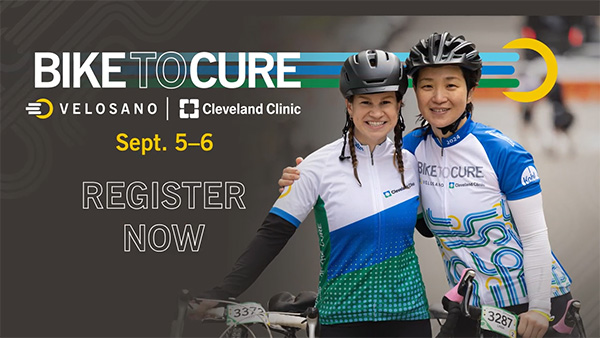
We all know someone who has been impacted by cancer. Since its creation in 2014, VeloSano, Latin for “swift cure,” has been bringing together the cancer community with Cleveland Clinic’s world-renowned cancer research, innovation and care. The discoveries happening today will change lives tomorrow.
Bike to Cure is our flagship fundraiser for VeloSano—an annual bike ride where 100% of participant-raised dollars support cancer research at Cleveland Clinic. This year’s ride takes place Sept. 5-6 in Cleveland. Registration is open now.
The event brings together cyclists of all abilities and the cancer community. From casual riders to seasoned professionals, volunteers, families, patients and partners, everyone is united by a common goal: to fuel better treatment options, improve outcomes for patients and families and ultimately cure cancer. This mission-filled weekend includes our Kickoff Party to celebrate our VeloSano community and Ride Day, which features route options for every level of rider.
For anyone who wants to end cancer, there are many opportunities to get involved with VeloSano. Join as a rider or volunteer at Bike to Cure in September, fundraise your way anytime and anywhere as a Virtual Fundraiser or become a partner. No matter how you participate, you become part of a vibrant community driving Cleveland Clinic’s global impact in cancer research, innovation and care.
Let’s make a difference together. Learn more about Bike to Cure here.
Rewriting the Future for Lymphedema Patients
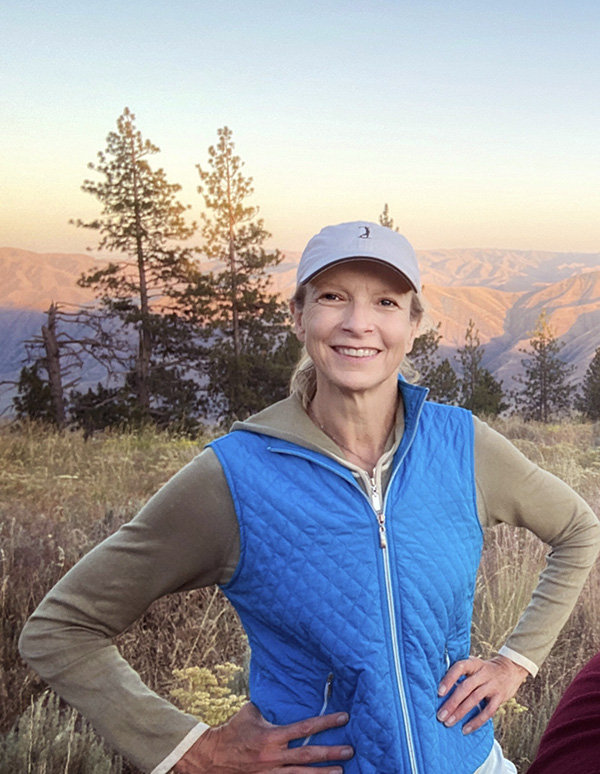
Most people remember life before and after lymphedema. For Laurie Houck, who was diagnosed with primary lymphedema at five years old, there is only after.
The lymphatic system is designed to remove damaged cells, bacteria and waste products from the body. Lymph vessels collect fluid that passes through lymph nodes before returning to the bloodstream. From there, the liver and kidneys filter waste to be eliminated in urine and stool.
When this system fails, excess fluid remains trapped in the body’s tissues. The result is lymphedema, a chronic condition characterized by heaviness, tightness and pain, often starting in the legs.
For some people, secondary lymphedema develops after cancer treatment or infection. Others have a genetic predisposition to the condition. Laurie can trace lymphedema as far back as her great-grandmother, who died in her early 20s from a related leg infection before antibiotics were available. When Laurie and her brother both developed lymphedema, they became the next two in their family line.
At five years old, her condition was mild enough that she could play on the playground with other kids. “But I had a constant feeling of being weighted and uncomfortable,” she remembers. “And even if lymphedema didn’t impact my activity level, it shaped my confidence. I knew that when people looked at me, they noticed how swollen my feet, ankles and knees were.”
Laurie's mother bought her children off-the-shelf compression garments before lymphedema was a recognized condition, pushing them to stay active and to avoid thinking of it as a disability or something that prevented them from reaching their goals. At age 14, she was formally diagnosed with lymphedema by Gene Strandness, MD, a pioneer in developing Doppler ultrasound as a diagnostic tool in vascular medicine.
While lymphedema has not limited Laurie’s potential, it has drastically altered the course of her life. As a child, she dreamed of becoming a large animal veterinarian. By her college years, she realized that the physical demands of the job would always exceed her physical capabilities. She pivoted to a career in educational fundraising, which has taken her from her hometown of Walla Walla, Washington, to Seattle, Ohio and Florida. For the past eight years, she has served as Vice President for Institutional Advancement at Rollins College in Winter Park, Florida.
Her career has always involved air travel, which made management of the condition all the more challenging. By her 50s, the swelling reached her torso.
“I wore compression from my toes to torso, but when flying, the combination of swelling and compression was squishing my organs and causing terrible stomach issues,” she says.
On a good day, Laurie enjoyed playing golf, tennis or cycling with her husband, always in the morning before work or on a weekend day. But inevitably, one long bike ride meant spending the rest of the weekend in bed.
“I reached the point where all I could do was swim, work and lie down,” she remembers. “Non-invasive treatments for lymphedema were no longer working. I was at my absolute wit’s end. It was no quality of life.”
She began researching physician-researchers online, determined to identify practitioners at the forefront of their field given the severity of her disease. She ultimately turned to Wei Chen, MD, PhD, a reconstructive supermicro-surgeon at Cleveland Clinic who is passionate about improving life for lymphedema patients through surgical innovation.
In Dr. Chen, Laurie found a straight shooter. “Dr. Chen made it clear that he would do his best, and he thought he could help me, but to what extent was unknown,” she remembers. “I decided to take a chance. Any improvement was better than the way I was feeling every day.”
Over the next four years, Laurie underwent multiple surgeries to repair and rewire her lymphatic system. The initial surgeries focused on removing damaged tissue, where cellular waste had settled and hardened. Subsequent surgeries involved bypassing lymph nodes by rerouting lymph vessels into new veins to improve drainage.
“The way I understand it, these procedures are like cleaning out buildup in pipes before connecting the pipes differently,” she explains.
For Laurie, surgery has been nothing short of transformational. Before meeting Dr. Chen, she would spend every evening doing whatever household tasks she could accomplish while sitting. Now, she not only exercises before work but often golfs or plays tennis in the evenings as well. She no longer feels ill every night, a common side effect from cellular waste built up throughout the day.
“People have noticed that I am physically lighter but also lighter in personality now that I feel so much better,” she shares.
While her life has changed for the better, she isn’t content with stopping here. Her two nephews both struggle with the condition, making her acutely aware of the need to break the generational cycle.
“Lymphedema has impacted five generations of my family,” she says. “I view myself as part of a medical arc toward a different future.”
To pay forward the care she has received, Laurie made a planned gift to create an endowed fellowship in honor of Dr. Chen. The fellowship, supporting the Dermatology and Plastic Surgery Institutes, will help the next generation of surgeons develop leading-edge surgical treatments for lymphedema.
“I have seen the impact of medical innovation in my lifetime,” Laurie reflects. “I was told even into my 20s that there would never be much hope for a better life with lymphedema. No one knew if it would progress, or even if it would end my life. I was even told not to have my own children. To go from that to microsurgery is incredible progress.”
But there is still ground to cover.
“There are not enough surgeons like Dr. Chen,” she concludes. “I owe my quality of life for the next 30 years to him and to Cleveland Clinic. By supporting training and research, I hope to change the future of generations to come.”
Philanthropy Comes Naturally for Treasure Coast Couple
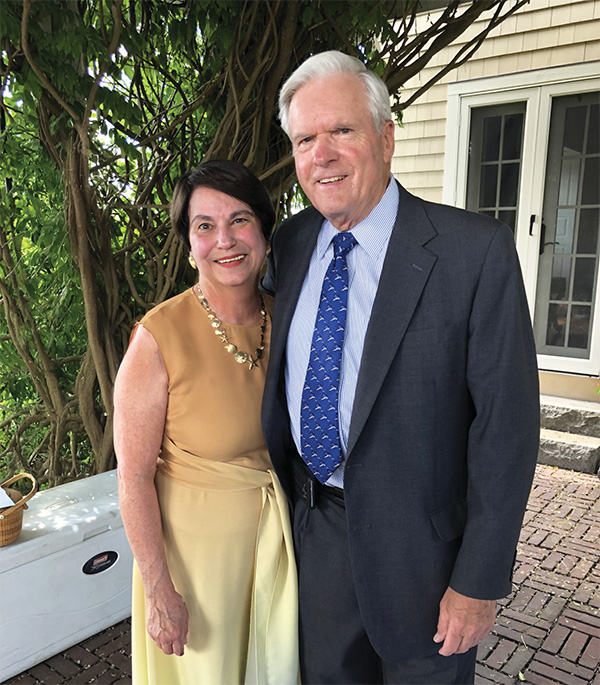
Chris and Whitney Chandor have a considerable history of volunteer and philanthropic work, supporting various educational, arts, cultural and historical organizations. Chris has served on the board of the Heritage Conservancy, a land conservation nonprofit, for more than 35 years, and Whitney has been significantly involved with Doylestown Hospital in Bucks County, Philadelphia since the 1970s.
“Our hospital was founded in 1923 by a dozen ladies,” Whitney says. “They started a hospital in their home and now it’s a 250-bed hospital where doctors do open heart surgery. I’ve served on the board and the Foundation board many times.”
Whitney and Chris, a successful attorney and semi-retired real estate developer, now split their time between their home in Bucks County, Philadelphia, and the Treasure Coast. “We fell in love with the Treasure Coast 20 years ago,” says Chris.
The couple learned about Cleveland Clinic Tradition Hospital in 2024 after attending a donor event in their Harbor Ridge community that focused on the Emergency Department (ED) Fast Track project.
Inspired by the presentation and eager to support Cleveland Clinic, the Chandors made a gift to support the project, becoming members of the Barstow-Reed Society.
The ED Fast Track project will add six bays to treat low-acuity cases, with the goal of getting those patients in and out of the hospital in 90 minutes.
“I think it’s a very good idea,” Chris says. “It’s a very wise idea to segregate minor ailments like sore throat and earaches from appendicitis and heart attacks.” Whitney adds, “I’ve been very impressed with their innovation and was taken with this project.”
The couple wants to encourage others to support Tradition Hospital’s ED Fast Track project.
“We toured the hospital and liked what we saw,” says Chris. “Good healthcare is important, and we wanted to direct resources to that area. Someday you may find yourself in need of an ED or a hospital. You want to support it so it will be there for you.”
From Pastures to Patients
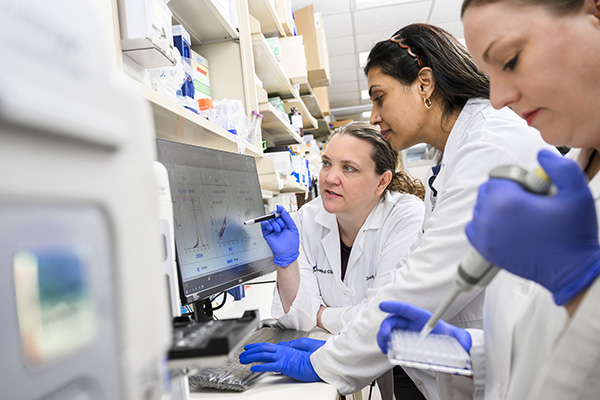
Whether treating a sore throat or aiding an open-heart surgery, antibiotics are a cornerstone of medicine. However, this dependence is leading to more antibiotic-resistant bacteria in people. Alternative treatments for bacterial infections must be developed for future healthcare delivery.
A visionary Cleveland Clinic caregiver is working on a new therapeutic using DNA from an unexpected farm animal. With her background in veterinary medicine and immunology, Jeannette Messer, DVM, PhD, Assistant Staff at Cleveland Clinic Main Campus, has a unique insight into what may lead to the next breakthrough.
Dr. Messer and her team at Lerner Research Institute are creating a recombinant (artificial) antibody based on a DNA sequence from an alpaca. Now, thanks to Cleveland Clinic's Catalyst Grants program, they are currently testing it against several types of bacteria and improving upon its effectiveness.
“We finally were able to make an antibody that was broadly blocking attachment to human cells by all these different bacteria,” says Dr. Messer. “The underlying disease mechanism has relevance across multiple species, and that's what we're doing in the lab.”
This new anti-infective would allow clinicians to diagnose and treat disease based on shared disease mechanisms rather than microbes specific to certain illnesses. Her life’s work began years ago, and after successfully blocking E. coli adhesion, Dr. Messer received a Catalyst Grant to further the concept.
Catalyst Grants are funded annually by thousands of gifts of all sizes from donors. The competitive grants are awarded to caregivers with ideas to improve the lives of Cleveland Clinic patients, the organization and communities around the world. Dr. Messer and her team were awarded a $100,000 Catalyst SPARK award, a grant given with the hope of transitioning ideas into medical innovations.
Dr. Messer’s research embodies what Catalyst Grants aims to achieve. The program allowed her to take a giant leap in her research and gather the data that makes her project competitive for external funding.
"There’s no way we would have reached this point if not for Cleveland Clinic’s investment in this because it was just too high risk for anyone to take it on,” says Dr. Messer. “The Catalyst Grant let us play in the space that didn't exist and had never existed and do things that there were really no strategies to do.”
Her tenacity has also led to an additional $100,000 prize from Jones Day that she was awarded at a pitch competition during Cleveland Clinic Weekend. With this, Dr. Messer hopes to get to the next phase of advancement.
“I do research because it changes lives and helps people,” says Dr. Messer. “I think that we're all on that mission, and none of this would move forward without donors. We could have great ideas, but if they never get developed, then it doesn’t do anybody any good, right?"

